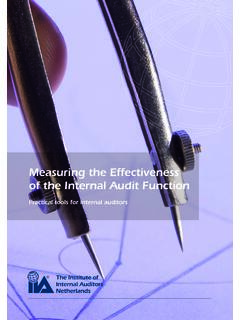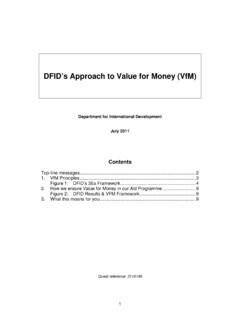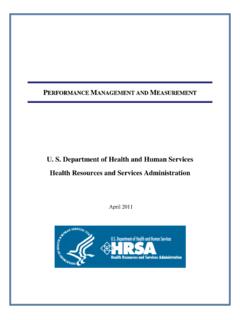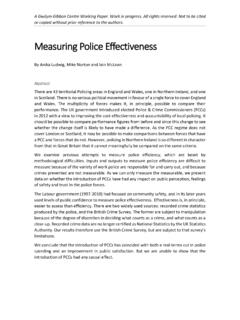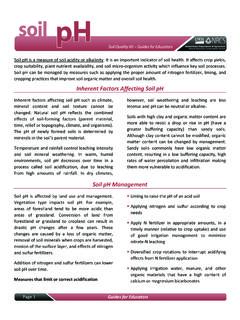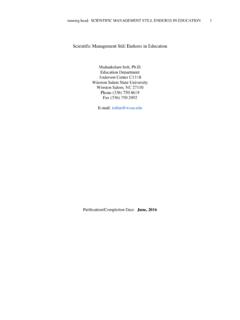Transcription of Improving Health Care System Efficiency for Equity ...
1 1 Copyright iMedPub | This article is available in: of Health & Medical EconomicsISSN 2471-9927 Vol. 6 No. 1: 45iMedPub ArticleDOI: Health Care System Efficiency for Equity , Quality and Access: Does the Healthcare Decision Making Involve the Concerns of Equity ? Explanatory ReviewAbstractBackground: Healthcare is a complex investment which requires a number of stakeholders to produce desired Health outcomes. In addition to its complex nature, availability of limited resources for providing healthcare for population poses a number of questions for policy makers. Among these multitudes of questions, Efficiency , Equity and effectiveness have complex interplay and require balanced tradeoff. Therefore, this explanatory review was conducted with intention to provide basic information on how to incorporate Efficiency , Equity and effectiveness in healthcare decision : We systematically searched PubMed/Medline, Scopus, and Google scholar with the following with the following queries: effectiveness , Efficiency , Equity , Delivery of healthcare, Health care decision : Inefficiency in Health systems is a global problem.
2 About 20-40% global Health expenditure is considered as w stage. Efficiency , effectiveness and Equity are synergistic pillars of quality healthcare System . Improving Efficiency in Health System can reduce raising healthcare expenditure. Providing equitable care for all has national and international importance. Priority setting, multiple criteria decision making and incorporation of Equity impact and trade-off analysis on cost- effectiveness can be used for balancing tradeoff between Efficiency , Equity and effectiveness . Conclusion: Efficiency of healthcare System is important for Improving , Equity , effectiveness and access to healthcare. Taking Efficiency into healthcare delivery with full understanding of determinants of disease in specific population can provide room for Improving effectiveness and Equity in healthcare as evidenced by presence of avoidable wastages and inefficiency in every healthcare System . Equity should be considered during planning process along with economic : Efficiency ; Equity ; effectiveness ; Healthcare decision makingReceived: April 06, 2020, Accepted: May 12, 2020, Published: May 19 , 2020 Mende Mensa Sorato*, Akbar Abdollahi Asl and Majid Davari Department of Pharmacoeconomics and Pharmaceutical Administration, Faculty of Pharmacy, Tehran University of Medical Sciences, Iran*Corresponding author: Mende Mensa Sorato of Pharmacoeconomics and Pharmaceutical Administration, Faculty of Pharmacy, Tehran University of Medical Sciences, IranTel: +98-9056309138 Citation: Sorato MM, Asl AA, Davari M (2020) Improving Health Care System Efficiency for Equity , Quality and Access: Does the Healthcare Decision Making Involve the Concerns of Equity ?
3 Explanatory Review. J Health Med Econ. Vol. 6 No. 1: is a complex investment which requires a number of stakeholders (direct and indirect) contribution to produce the desired Health outcomes. In addition to its complex nature imperfect market in the field and limited/scarce resources for providing healthcare for population poses a number of questions for policy makers. Among these multitudes of questions, Efficiency , Equity and effectiveness have complex interplay and require balanced tradeoff between them [1]. Efficiency is a measure of the quality and/or quantity of output for a given level of input. It could be technical or allocative. Allocative Efficiency is use of limited resources towards producing the correct mix of Health care outputs. Technical Efficiency is the extent to which the System is minimizing its inputs in producing its chosen outputs, regardless of the value placed on those outputs [1-3].Inefficiency in Health systems is a global problem and approximately 20-40% of all resources spent on Health were 2020 Vol.
4 6 No. 1: 452 This article is available in: of Health & Medical EconomicsISSN 2471-9927wastage [1]. For example, $760 billion to $935 billion, accounting for approximately 25% of total Health care spending in US Health System is wastage [4]. In Namibia 52% Public Hospitals were technically inefficient [5]. In Ghana only 24% district hospitals were technically efficient [6]. In Eretria about 68% of hospitals were technically efficient and only 42% were scale efficient [7]. Similar study conducted in 2016 among primary Health centers in Ethiopia showed that 54% of sampled Health centers were technically inefficient [8]. Major reasons for inefficiency in Health sector include: in appropriate Medicine use; over or under supply Health services; inappropriate Health task force mix, medical errors, suboptimal quality of care, corruption and poor integration of Health facilities [1,9]. Today almost all countries in the world are focusing on Efficiency of their Health care System to ensure universal Health coverage [1,2,10-12]In addition to inefficiency problem, Health System is also suffering from Equity problem.
5 This is because Health economic evaluations continue to focus on maximizing Health gain and Health Equity considerations are rarely mentioned [13]. Health care System should ensure access to: good quality care for patients who need them at a reasonable price. There is always debate on three important terms, Efficiency , Equity , and effectiveness . They usually go together and right approach to address them will improve welfare of society [14,15]. Despite the presence evidence about effectiveness is healthcare interventions, translating evidences into practice requires tradeoff between effectiveness , Efficiency and Equity due to scarcity of available Health resources [16]. However, Policy makers and managers in the Health care System face difficulty in addressing them together. This explanatory review was conducted with intension to describe the role of addressing Efficiency on Equity , effectiveness and access to strategyWe have systematically searched PubMed/Medline, Scopus, and Google scholar with the following with the following search query.
6 effectiveness , Efficiency , Equity , Delivery of healthcare, Health care decision making. Inclusion exclusion criteria Studies described Efficiency , Equity , effectiveness and healthcare decision making were included Studies conducted in English Language are included Short communications, and conference proceedings are excludedStudy selection and Evidence synthesisFrom total of 152 articles identified by literature search 93 potentially relevant articles were selected, after applying the inclusion exclusion criteria listed above only 65 articles were found to be relevant [17] (Figure 1). Two investigators (MM, AA) independently reviewed each study s abstract against pre-specified inclusion and exclusion criteria. In case of disagreement on quality of the article two authors discussed In front of table in presence of the third author (MD). Evidence synthesisWe qualitatively synthesized the evidence. Firstly we defined Efficiency how to measure Efficiency in Healthcare System .
7 PRISMA Flowchart representing the result of search and the number of articles excluded and eligible for 1 2020 Vol. 6 No. 1: 453 Journal of Health & Medical EconomicsISSN 2471-9927 Under License of Creative Commons Attribution LicenseSecondly we answered the following questions. Can efficient systems in inequitable? Can efficient systems improve Equity ? Can efficient systems improve quality of care? Can efficient systems improve access to care? What is optimum level tradeoff between these variables? How to incorporate them in Healthcare decision making process/Can our Cost- effectiveness evaluation consider the issue of Equity ?ResultsWhat is Efficiency ? Efficiency can be defined as the ratio of output to the input ( Efficiency = Output/Input). However measuring Efficiency organizations with multiple outputs and inputs like hospitals is difficult to determine by the above model. Therefore Efficiency of organizations with multiple inputs and outputs can be calculated by weighed cost approach as follows [18,19].
8 Weighed Sum outputsEfficiencyWeighed Sum of Inputs=The above equation assumes all the weights are uniform. Mathematically it is expressed as:11nrrrmiiiuyEfficiencyvx=== Where: y =quantity of output r; u =weight attached to output r; x =quantity of input i; v =weight attached to input i. Value equal to one indicates perfect Efficiency (100%) and 0 Efficiency Efficiency of an organization can be measured from input orientation or out-put orientation. In the former we pull all the DMUs to origin towards Efficiency frontier and the curve takes convex shape ( we require small inputs to produce large outputs to improve Efficiency ). While in case of output orientation we push all DMUs away from the origin towards the frontier and the curve takes concave shape ( to improve Efficiency large outputs should be produced with similar inputs [3,20]. This approach answers the question by how much quantities an output can be expanded without changing the inputs.)
9 In this case we push the DMUs away from the origin towards Efficiency frontier and the curve takes concave shape. Both output and input orientation will only provide equivalent estimates of technical Efficiency if there is constant rate of return scale and they are unequal when decreasing or increasing rate of return exist [21]. Efficiency , Equity and effectivenessThe Institute of Medicine defines Health care quality as the degree to which Health care services for individuals and populations increase the likelihood of desired Health outcomes and are consistent with current professional knowledge Quality is defined by the following domains: effectiveness , Efficiency , Equity , Patient centeredness, Safety and Timeliness of care delivery [22-25]. Efficiency , Equity and effectiveness are core values of quality healthcare (Figure 2). They are interrelated and if appropriately considered they are synergistic in nature. However, if not considered appropriately in healthcare decision making they might result in an adverse outcome [22-27].
10 How can Efficiency improve Equity ? Equity is the absence of avoidable or remediable differences among groups of people, whether those groups are defined socially, economically, demographically, or geographically. Health inequities therefore, involve more than inequality with respect to Understanding complexity of Health policy making from Economics principle. Adapted from The Belgian Health System Performance Report 2012: Snapshot of results and recommendations to policy 22020 Vol. 6 No. 1: 454 This article is available in: of Health & Medical EconomicsISSN 2471-9927health determinants, access to the resources needed to improve and maintain Health or Health outcomes [28,29]. Health Care Financing in low and middle income countries are pro-rich and there unmet Equity needs to unsure universal Health coverage. The distribution of benefits at the primary Health care level favored the poor while hospital level services benefit the better-off [30]. The richest quintile receives of total benefits compared to the received by the poorest quintile.

